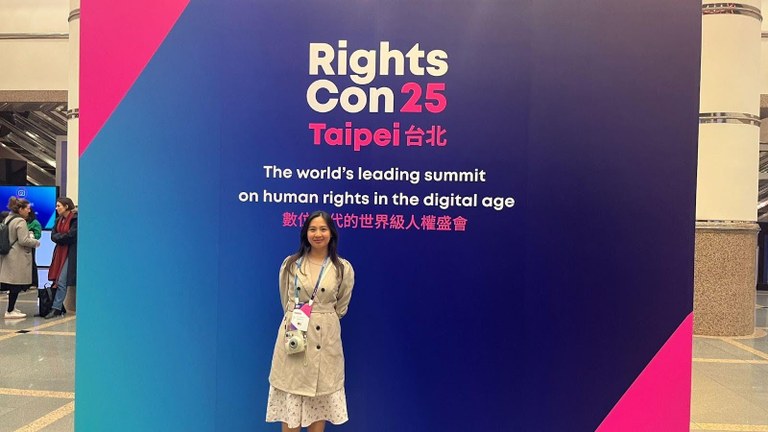
Reflecting on RightsCon 2025: What Happens in Taipei, Doesn't Stay in Taipei
Corina our legal fellow from the Malaysian Bar shares her key take ways and experiences from attending RightsCon 2025 in Taipei for the first time. She highlights sessions that reshaped her perspective, covering topics like the Meta Oversight Board’s role in moderating online speech, designing safer digital spaces for children by targeting harmful features rather than entire platforms, and the emerging field of AI auditing as a tool for accountability.
This post is also available for download here.
24-27 February 2025

My first time seeing cherry blossoms in real life!
On my last night in Taipei, I took a moment to reflect on my first-ever RightsCon experience, sifting through the materials I had gathered throughout the conference—including an impressive collection of stickers. As I revisited my notes and memories, I focused on holding onto the convictions that resonated with me most.
Here’s what came out of that reflection:
The Logistics of It All!
I couldn’t help but admire the seamless execution of RightsCon 2025—it was truly a masterclass in logistics. From pre-conference newsletters to post-event wrap-ups, every detail was meticulously planned, ensuring a smooth and engaging experience. At the same time, as participants, we had the freedom and flexibility to curate our journey throughout the week, making the event both structured and personalised.
The RightsCon online platform was intuitive, feature-rich, and incredibly easy to navigate. With a variety of in-person, online, and hybrid sessions, they were not only accessible but also designed with diverse needs in mind, ensuring inclusivity for all attendees. Besides that, the organisers also stationed a support booth at the international airport. During the conference, the fourth floor of the conference was designated as the quiet floor, specifically designed for those who wish to focus, relax, or connect privately with fellow participants. There were also a lactation room, a medical room, and counseling services available.
Post-event, we can relive some of our favourite sessions or discover new ones through their recordings, which are made available to the participants. However, not all of the sessions’ replays are available.
Of course, this level of excellence should not be a surprise—Access Now has been fine-tuning this event for over a decade!
As for the venue, the facilities were fantastic, but navigating the building sometimes felt like unlocking a real-life escape room—the maze of doors and hallways kept me on my toes, and I got lost a few times on my way to the next session.
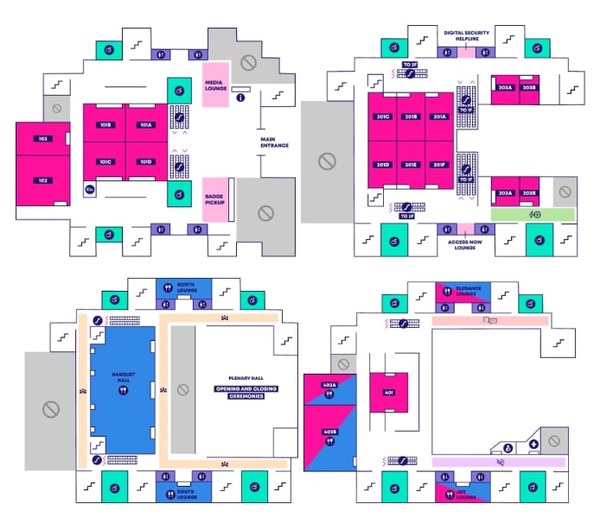
One minor thing—you know how Malaysians are about our food! I have to say, while the burgers were manageable, I would have loved a more culturally diverse selection for lunch.
Ideas Worth Implementing in Malaysian Events
- Pre-Event Communication Hub: A centralised online platform with intuitive features is worth investing in. The ability to curate my personalised schedule was my favourite feature on their website! I also love the idea of stationing personnel to support incoming participants at the airport.
- Inclusivity First: As an international conference, multi-language support is vital. Besides that, Access Now walks the talk. The facilities and services available are gender-neutral, friendly to differently abled persons, and take into account various neurological conditions.
- Post-Event Wrap-Ups: I love the idea of making the sessions’ recordings available post-event. It is a simple but thoughtful feature that will ensure returning participants.
Bite-Size Takeaways from Perspective-Shifting Sessions
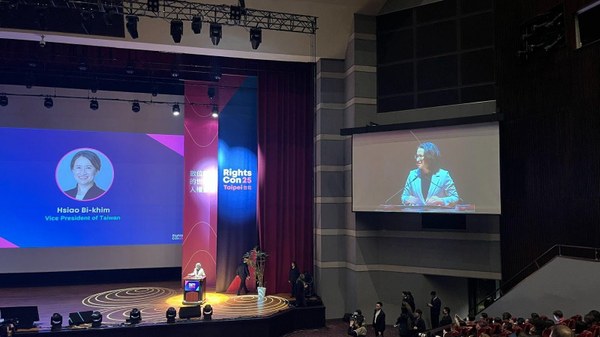
The mix of in-person and hybrid sessions maximized how we could engage with the knowledge shared by the speakers. The available formats included workshops, roundtables, dialogues, private meetings, lightning talks, tech demos, meetups, and film screenings—not to mention the opening and closing ceremonies.
I gravitated toward sessions focused on cybercrime, online harms against children, artificial intelligence and deepfakes, and real-life accounts of law-making and policy-making in addressing these challenges.
Due to the topics of my interest, I had the opportunity to attend sessions in the format of workshops, dialogues, roundtables, meetups, and a lightning talk, in addition to the ceremonies. Looking back, I wish I had experienced a tech demo—it’s one of those things I now regret missing. Even though I only spent one session there, 2F South Hallway (where the lightning talks and tech demos took place) could have easily been my favorite hangout spot.
The Oversight Board (Meta) and its role
The first session that left a strong impression on me was “Navigating hate speech and intolerence online: insights from the Oversight Board”. Through this session, I gained a deeper understanding of the Oversight Board’s work. From what I gathered, the Board was created by Meta to help it resolve issues relating to freedom of expression. The Board appears to operate as an independent body to whom people can appeal if they disagree with Meta’s content enforcement decisions. Statistics shared by the Oversight Board show that they have made 290 recommendations to Meta as of 2025, 62% of which have been fully or partially implemented or in the process of implementation.
Noting the composition of the Board members, during the Q&A session, I asked about the role the Oversight Board could play in assisting countries to balance freedom of expression and censorship issues in local contexts. Perhaps naively, as a legally qualified person, I was secretly wondering whether the Oversight Board would ever be willing to testify as expert witnesses in court cases should such a need ever arise and whether they are in conversation with the Malaysian Communications and Multimedia Commission to provide policy advice. In response, the speakers clarified that their role is to decide on cases and encourage Malaysians to submit cases for their review. However, they also noted a caveat: their jurisdiction ends where a country’s legislation begins—a reminder of the limitations of platform governance when it comes up against national laws.
Creating a Safe Environment for Children and Youth
“Target features, not platforms.” This was the most perspective-shifting takeaway for me from “Safe digital futures: designing for thriving children's mental health.”
The ability of people to cause real harm in the digital space reminds me of Matthew McConaughey’s speech at the University of Houston:
“Nothing that we, homo sapiens, do is unbelievable. And if there’s one thing you can depend on people being, it’s people… So, acknowledge the acts of greatness as real and do not be naive about mankind’s capacity for evil nor be in denial of our own shortcomings.”
With Malaysia’s increasing over-regulation of the digital space, it was refreshing to hear one of the speakers challenge us to rethink what a safe online environment for children should look like. Should platforms be criminalized for every single harmful interaction that youths experience online? Should the entire burden fall on platforms to shield them from all possible harm?
If we zoomed out and examined the bigger picture—how we now put phones and tablets in front of children as early as age one—what would we see? More importantly, how do we begin to address these issues?
The panelists had a simple answer, though one that is not very easy to implement: engage children and the youth in the policymaking process when drafting legislation that affects them.
The best way to navigate “people being people” is to actually consult them on what would work best for them. What features do they need? What solutions would be most effective? Blanket bans are pointless—people will always find ways around them. Instead, when we conduct consultations, we should give everyone their due regard. Be fair, open, transparent, and honest in our dealings.
One example shared by the speakers was a key insight from conversations with young people about their experiences with technology: reporting a person often feels too punitive, especially in the context of intimate conversations. Instead, they prefer the ability to simply remove themselves from the situation—whether temporarily or permanently. This can be achieved through features like blocking or muting a contact, allowing them to set boundaries without escalating the situation.
As can be seen, it will do everyone good to remind ourselves that the technologies were created and introduced to the youth, and they have made them their own. Now, let them decide what they need to navigate the digital landscape.
AI Auditing: A New Job in the Market?
If you Google “AI auditing in Malaysia,” the first page of search results is all about AI in auditing processes, rather than auditing AI itself. Clearly, we have some catching up to do.
From “Covering the last mile of accountability and oversight: AI auditing,” I learned that AI auditing is the process of inspecting AI systems for various risks—from bias and security vulnerabilities to ethical concerns. This concept fascinated me because it envisions a future where non-technical users can assess AI systems just like food safety ratings or cybersecurity certifications. One day, someone could look at an AI product and think, “Ah, this system has received this certification and grade, so I can trust it.” Beyond just accountability, AI auditing is also creating new career opportunities, bridging the gap between technology, ethics, and policy.
Bridging Global Insights with Local Advocacy
- Leveraging the Oversight Board for Local Advocacy: While I’m not sure what those more familiar with the Oversight Board think, I would like to explore how Malaysia could engage with global structures like this in a more meaningful way. Beyond just submitting cases, we could contribute localized insights by assisting the Oversight Board with research—providing context that might help shape their decisions if we ever choose to bring a case forward.
- Meaningful Consultation Processes Do Wonders: Effective policies come from genuine, inclusive consultation—grounding decisions in real-world experiences rather than top-down approaches. For Malaysia, this means moving beyond token engagement. Whether shaping digital rights policies or tackling cybercrime, we must center the voices of those directly affected to create real, lasting impact.
- AI Auditors, Another Job in the Market: We should be preparing for this emerging field by developing expertise, frameworks, and policies that ensure AI systems are transparent, accountable, and trustworthy.
RightsCon 2025 was just the beginning
Side Meetings: Where the Real Deals Happen
The most interesting side meeting that I had the opportunity to attend was one with various parliamentary monitoring organisations, chaired by Taiwan’s Citizen Congress Watch.
It was eye-opening to see the advanced tools and monitoring mechanisms that other countries have implemented and the results that they have produced. For instance, Taiwan has a grading system for parliamentarians, well-advanced into metrics beyond just attendance in parliament. At the end of the term, parliamentarians who have performed well would be presented with awards, which some of them would use to garner support during their campaign in the next election. Having never encountered such an idea before, this was mind-blowing to me.
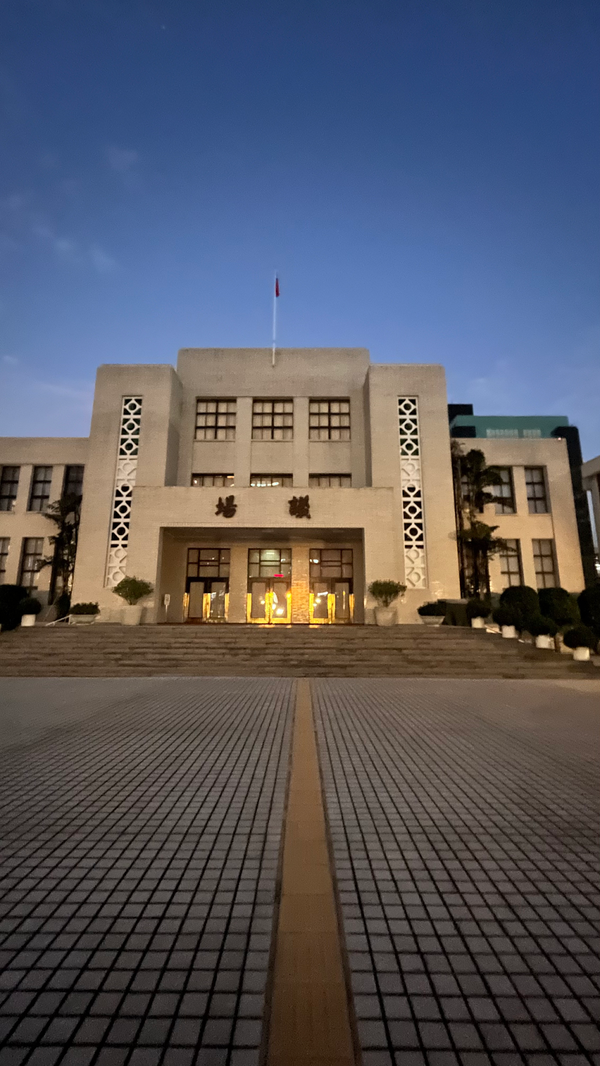
We also saw Taiwan’s parliament building! We were told that it was built during the Japanese colonial period and used to be a girls’ high school before this.
Still, it is common knowledge that sustained funding is crucial for such a feat. Maintaining a platform and organisation at a level where it is seen as legitimate, effective and impactful requires significant financial resources—not just for tech infrastructure, but also for research, advocacy, and public outreach.
New Friends, Big Plans
Networking is a sport, and I played as hard as I could—especially on the first and second day, maximising every opportunity to meet new people, exchange ideas, and explore potential collaborations.
I was introduced to a diverse range of organisations and funders with whom I would have never crossed paths otherwise—including groups working in highly restricted environments like North Korea. These conversations offered valuable insights into how advocacy and digital rights work in challenging political climates.
Beyond that, I connected with other organisations facing similar dilemmas as Malaysia, especially on whether to regulate AI, such as those in Brazil, and exchanged contacts to share strategies on navigating censorship, digital security, and policy-making hurdles.
Final Thoughts
This wasn’t just a conference—it was a movement. The insights gained and relationships built will shape the digital rights fight in Malaysia for years to come. I would like to thank Sinar Project, and Luminate for this once-in-a-lifetime opportunity. The experience was insightful and refreshing, and I hope to contribute towards creating a better environment for the advancement of legal tech in Malaysia.
I would also like to thank Sarah Yong Li Hsien for encouraging me to apply for the travel support and being my reference. I look forward to applying the knowledge that I have gained in my work at the Malaysian Bar.
About Author
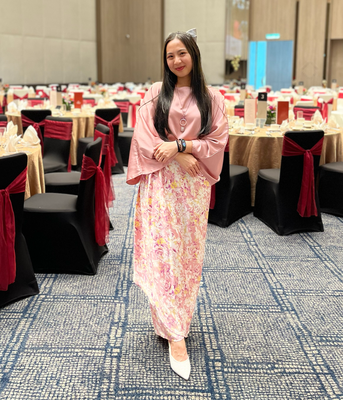
Corina Robert Mangharam is a non-practising advocate and solicitor of the High Court of Malaya. During her university years at Universiti Malaya, she was actively involved in several initiatives, including the University of Malaya Law Review, Community Awareness Week, A Day of Light, and ECOLAWGY UM. In 2017, she interned at the Attorney-General’s Chambers in Sabah. Just before the COVID-19 pandemic, she and her peers co-founded HAKAM Youth under the supervision of Dato' Dr Gurdial Singh Nijar to advocate for humanitarian issues.
After graduating in 2020, Corina completed her pupillage under Mr. Fahri Azzat at Messrs. Fahri, Azzat & Co. She then joined Family Frontiers as an Advocacy and Community Engagement Coordinator, where she supported Malaysian mothers in their fight for equal citizenship rights for overseas-born children before her current employment at the Malaysian Bar Secretariat. She is also an independent editor with over 6 years of experience.


